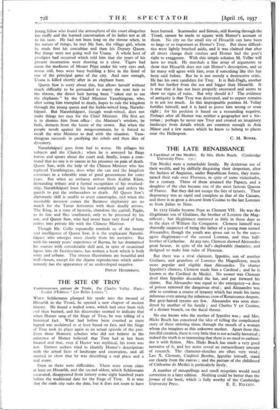THE LATE RENAISSANCE
A Cardinal of the Medici. By Mrs. Hicks Beach. (Cambridge University Press. 15s.)
THE Medici were a remarkable family. By dexterous use of their wealth, and by skilfully disguising their despotism, after the fashion of Augustus, under Republican forms, they main- tained their rule over Florence, in spite of some vicissitudes, for a century. Three of them attained the Papacy, and a daughter of the clan became one of the most famous Queens of France. 'But they did not escape the fate of tyrants. Their degeneracy was as rapid and complete as that of the Caesars, and there is as great a descent from Cosimo to the last Lorenzo as from Julius to Nero.
In 1523 Giulio became Pope as Clement VII. He was the illegitimate son of Giuliano, the brother of Lorenzo the Mag- nificent ; but illegitimacy mattered as little in those days as in the days of William the Conqueror. Clement himself was shrewdly suspected of being the father of a young man named Alessandro, though the youth was given out to be the son— again illegitimate—of the second Lorenzo, and thus half- brother of Catharine. At any rate, Clement showed Alessandro great favour, in spite of the lad's deplorable character, and designed to make him ruler of Florence.
But there was a rival claimant, Ippolito, son of another Giuliano, and grandson of Lorenzo the Magnificent, much more popular and eligible than Alessandro. To shatter Ippolito's chances, Clement made him a Cardinal ; and he is known as the Cardinal de Medici. No sooner was Clement dead than Ippolito discarded the hat, and put forward his claims. But Alessandro was equal to the emergency—a dose of poison removed the dangerous rival ; and Alessandro was able to continue a course of tyranny which has made his name infamous even among the infamous crew of Renaissance despots. But grey-haired tyrants are few. Alessandro was soon mur- dered by another of his family ; and Charles V set Cosimo, of a distant branch, on the ducal throne.
No one knows who the mother of Ippolito was ; and Mrs. Hicks Beach has conceived the idea of telling the complicated story of these strirring times through the mouth of a woman whom she imagines as this unknown mother. Apart from this fanciful creation, there is very little that is not actually historical ; indeed the truth is so interesting that there is no need to embroi- der it with fiction. Mrs. Hicks Beach has made a very good narrative of it, and her notes reveal an extraordinary amount of research. The character-sketches are often very vivid ; Leo X, Clement, Cardinal ..Bembo, Ippolito himself, stand out clearly from the canvas ; and the picture of the childhood of Catharine de Medici is particularly lively..
A number of misspellings and small misprints would need correction in a later edition. Nothing could be better than the format of the book, which is fully worthy of the Cambridge






















































 Previous page
Previous page